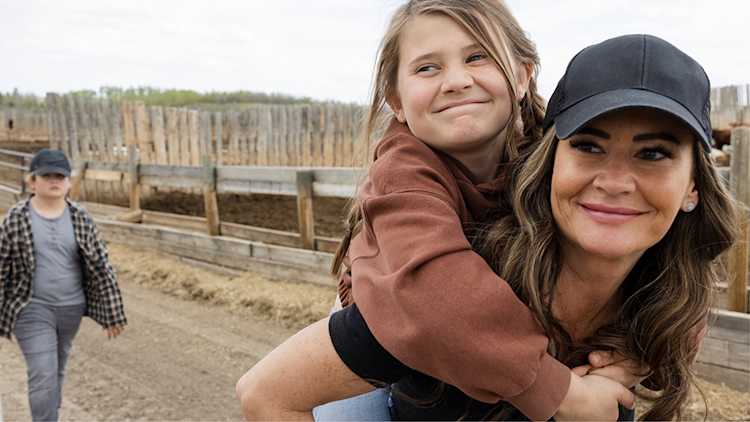Grow community connections, overcome isolation

As farms grow and rural lifestyles continue to change, maintaining a sense of community is an integral part of supporting your mental health.
The importance of connection
Humans are wired for connection, and farm operators are no exception.
Bonnie Taylor, a registered social worker and psychotherapist based in Kitchener, Ont., says humans are wired for connection, and farm operators are no exception. But, with the distance between farms growing, so is the distance between farm operators and their nearest neighbours. There are fewer community activities, community centres and faith communities as the number of people living in rural Canada continues to decline. The sense of togetherness that was once found at places like local arts centres or hockey arenas is not always available.
The challenges of rural isolation
“Rural isolation can be a contributing factor to mental health challenges in different ways,” Taylor says. For young people looking to carry on farming, isolation can create a lack of mentorship with no one around to share their knowledge. For new farm operators who are finding a fresh start in a new community without any prior connections, it can be isolating to not know where to start. And, for senior members of the farm, farm transition can feel like a change in identity and a loss of connection with the farming community they’ve spent a lifetime building.
“It’s hard to find connections when you don’t know where to go,” Taylor says. Connection naturally happens in farming communities during times of hardship or crisis, such as a storm or an accident. “It's amazing how the agricultural community members will all come together, no questions asked,” she says.
When there’s no urgent need to come together, farmers can get lost in their workloads and worries. Feelings of isolation can be a catalyst for or worsen other mental health challenges. This is where being proactive about your mental health and deliberately making connections regularly can make a difference.
Recognizing signs of isolation
When Taylor hears from her clients that they're feeling depressed or anxious, it’s not always obvious to them why. She asks about changes in sleeping or eating schedules, physical and emotional health, or avoidance of social commitments – these can be telltale signs that something, like feelings of isolation, needs to be addressed.
Finding opportunities to connect
“There are plenty of ways to find connections,” Taylor says.
Service organizations or farming associations in need of volunteers or board members can be found both locally and provincially. Fun clubs or activities off the farm can help build a community. Shopping locally can help you stay connected with other farm operators and their families, especially those who are new to an area, she says.
“Hosting an open barn day is a great way for urban neighbours to learn about where their food comes from,” Taylor says. “And it also helps farm operators create their own opportunities for connecting with their community.”
Digital connections can also be a useful tool. “Technology, when available, can also be very helpful in connecting with others. Joining groups with people who share a common interest can increase feelings of happiness and connection,” Taylor says.
Joining a business peer group offers a unique opportunity to connect with like-minded entrepreneurs, even outside the agriculture sector. These groups, such as those organized through the Chamber of Commerce, bring together business owners who share the challenges of running and growing a successful operation.
By engaging with peers from diverse industries, you gain fresh perspectives, innovative ideas and strategies that can be adapted to your farm. Peer groups also provide a supportive network where you can exchange advice, celebrate successes and find encouragement during tough times, ultimately fostering both personal growth and business resilience.
Look after yourself and others
Making connections and building relationships can also mean there are people out there looking after you. Likewise, others may need care and attention sometimes that you can help to provide.
It can be difficult to have a conversation about someone’s mental health. Asking for help can be intimidating. Taylor hears many “what ifs” from her clients about the possibility of being judged or ostracized. However, for every what-if, there are plenty of positive possible outcomes, she says.
“Let's turn it around,” Taylor says. “Ask yourself, ‘What if I actually make a connection with somebody that says to me, ‘You know, I'm sorry you're feeling that way, and honestly, I've been kind of feeling that way myself lately’?’”
Taylor encourages everyone to learn how to effectively voice their concerns with a friend or family member. When someone is ready to ask, be prepared to listen, she says.
Knowing what resources are available can be another vital part of the conversation.
“You're not passing them off to another service, but essentially, you're walking with them and joining them to find some other support because you're concerned.”
Taking care of yourself, which includes connecting with others, is not a luxury; it’s a necessity.
Taylor suggests practicing self-care and fostering connection by:
Doing regular body scans and taking breaks during long workdays.
Connecting with others in person. Make plans to do this regularly.
Getting involved in community groups, clubs or organizations.
Reaching out to friends and family members about how they’re doing, listening to them and offering support.
Knowing mental health resources and crisis lines should you or others need them. Visit Do More Ag for national and provincial resources.
From an AgriSuccess article by Becky Zimmer.

